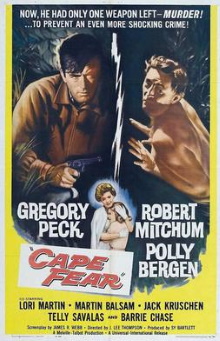This is a very shocking thriller on many levels and understandably ran into a lot of trouble with the censors of its era with its allusions to child rape. The main villain is unambiguously menacing and towards the end of the film truly monstrous, yet I liked the film more at the beginning when there was some doubt as to whether or not the protagonist is justified in deploying the full force of the law against the antagonist. I suppose it’s because times have changed so much that someone who a figure of authority invoking the law on his side is more frightening than a lone heinous criminal. While this ends up being a film that ramps up the tension effectively, I don’t like it much at all as I think it is both implausible and wants to deliver the wrong lessons.
Lawyer Sam Bowden is accosted one day by a man, Max Cady, who he barely remembers. Eight years ago, Bowden’s testimony as a witness to Cady assaulting a woman led to his imprisonment. Now he is out again and is intent on revenge. He has studied up on the law however and is careful not to break it, confining his actions at first to stalking Bowden and his wife and daughter. When Bowden’s dog is killed without him being able to prove that Cady did it, he goes to the police chief for help. The police begins a campaign of harassment against Cady, continually arresting and searching him, forcing him to prove that he has money to live on and so on. They are unable to pin anything concrete on him however and he hires a lawyer to get the police the back off. Bowden hires a private investigator to follow Cady around and he actually finds Cady assaulting a woman he picks. But the woman is too fearful of Cady to testify against him.
This is a good example of a film that has aged badly in all of the wrong ways. One difficulty is that censorship prevented the production from ever using the word ‘rape’, so the film has to allude to it from context and actor Robert Mitchum’s leers. There is meant to be no ambiguity at all that Cady truly is heinous and guilty but the film’s inability to say it straight out leaves some room for doubt in the minds of modern audiences. Add to that our predilection to be more wary of abuse of authority more than any lone criminal and it’s reasonable for us to question if the police’s actions truly are excessive or if Bowden made a mistake in sending Cady to prison. Yet this isn’t what the film intended at all as we are meant to agonize at the law’s ineffectiveness instead. It makes little sense to me that Bowyer couldn’t apply for some sort of restraining order that his friends in authority would happily grant and enforce. It’s extremely annoying that Bowden’s wife and daughter are portrayed as powerless victims entirely reliant on him for protection. My wife expected at one point that one of the women would fight back, because this would be what happens in a modern film, but of course that never happens here.
Partly because such explicit threats are so unexpected from a mainstream film of that era, it does ratchet up the tension and fear to seriously alarming levels. Even knowing better, it manages to evoke the thought of a physically powerful man like Cady who is determined to harm a family and is smart enough to do so intelligently as a potent villain. But of course I understand that this is an artificially manufactured fear and so tuned to the social mores of the time that it’s really not relatable to our era at all. It’s a sure sign of how conservative this film is that the final confrontation between Bowden and Cady is played out in the most traditional and least interesting way possible via fisticuffs. In the end, this was a shocking film in its time and retain a surprising amount of shock value even today. Yet it has nothing else going for it and can be considered repulsive in how it frames the issue of personal security. Skip this.
